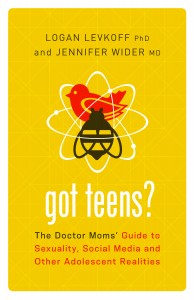|
|
April 15, 2014
 Actually, we’re playing AND learning! In my senior year in college I took a course called “Observation of Young Children.” For several hours a week I sat in a narrow, darkened room, behind a one-way mirror, looking into a pre-school classroom in action. Over the course of the semester I was assigned several 2-4 year olds to “observe” and to keep a log of every single thing the child did, how long he or she engaged in the behavior, etc. Later, I was to write up my detailed conclusions about whatever patterns I observed and what they might indicate about “my kids'” temperament, interests, learning styles, etc.
What I remember most was how seriously these young children took “playtime.” It was clear they were intently busy learning through play.
So in the late ’90s, when I first heard about Baby Einstein, a series of products of the “teach your baby to read” variety, I was skeptical. Babies and young children are in the business of figuring out how the world and everything and everyone they encounter operates. Hands-down, they learn best, with the greatest enthusiasm and retention, through hands-on exploration. (That includes but is not limited to touching, holding, jumping on, crawling through, rolling in, and sticking it in your mouth exploring.)
When I first heard about Brain Insights, my first thought was, “Oh is this another product for helicopter parents who need to chill?” Turns out, happily, it is not. Instead, Brain Insights, founded by early childhood educator, Deborah McNelis, is about understanding your child’s early brain development and using that to support a child’s learning through relaxed play. Bye bye smart apps for over-scheduled toddlers. Hello natural, hands-on parent-child fun!
Listen here to my conversation with Debora McNelis on this week’s Family Confidential podcast.

April 7, 2014
 Let me spell it out for you It’s Autism Awareness Month and organizations like Autism Speaks do a tremendous job in the areas of education, research funding, and providing resources for families. A couple of years ago, at this time of year, I was on a quest to learn more when I heard about Carly’s Voice : Breaking Through Autism by Arthur Fleischmann. I read the synopsis: “At the age of two, Carly Fleischmann was diagnosed with severe autism and an oral motor condition that prevented her from speaking. Doctors predicted that she would never intellectually develop beyond the abilities of a small child. Although she made some progress after years of intensive behavioral and communication therapy, Carly remained largely unreachable. Then, at the age of ten, she had a breakthrough.
While working with her devoted therapists Howie and Barb, Carly reached over to their laptop and typed in “HELP TEETH HURT,” much to everyone’s astonishment. This was the beginning of Carly’s journey toward self-realization.”
I was hooked, got my hands on the book and read it in three days. All I could think was, “Wow! There goes a whole bunch of assumptions about autism.” I was blown away by Carly’s intelligence, her wit, and her drive to communicate and be understood. I was also touched and inspired by her father’s relentless commitment to connect with her. I had to learn more about the story behind this story. I wanted to interview Arthur Fleischmann.
Social media being what it is, connecting with Arthur was easy. He graciously accepted my invitation to be my guest on Family Confidential. What a fascinating, dynamic and very personal conversation we had. I’m so pleased to share with you this never-before-published interview. Aruthur’s chronicle of life with his daughter Carly provides us all something to think about, especially when it comes to giving everyone the respect he or she deserves plus the opportunity to be heard. Listen here.

March 31, 2014
 An essential book for adoptive parents When kids “act out” you’d better believe strong emotions are the drivers. Parents and teachers usually pay attention to the behavior without taking time and patience to dig deeper and discover the trigger that unleashed the storm. What’s causing such distress in this child that s/he is acting this way? Discovering the answer is key to understanding children and ultimately helping them a) understand themselves better b) effectively manage their destructive emotions c) express themselves in socially responsible ways so that d) they can get their needs met without causing harm to themselves or others.
This truth was illustrated beautifully in a story Dr. Karyn Purvis told me during our interview for my podcast, Family Confidential back in 2010. Dr. Purvis is a Developmental Psychologist and Director of the Institute of Child Development at Texas Christian University (TCU) in Fort Worth. For the past decade, she and her colleagues have been developing research-based interventions for at-risk children. Dr. Purvis is also the co-author of The Connected Child: Bring Hope and Healing to Your Adoptive Family, a book that has helped countless adoptive and foster parents better connect with their children who have come from “hard” places.
In our recorded conversation Dr. Purvis tells me about a little girl playing in the kitchen while her mom makes dinner. The girl asks for a candy bar. Mom says, “No, sweetheart. Dinner will be ready in ten minutes.” The girl has a full-fledged meltdown, screaming, crying inconsolably. She throws things and physically and verbally abuses her mother. Mom has no idea what’s going on and feels powerless to help her daughter.
In desperation, Mom turns to Dr. Purvis and comes away with a better understanding of what was going on and how to meet her little girl’s needs without giving her candy every time she asks. Turns out this child was adopted from an orphanage where she often did not get enough to eat. When her mom said “no” to the candy, the girl panicked and remembered feeling powerless as she cried out in hungry, only to be ignored. Dr. Purvis’ compassionate response helped the mom and the child immeasurably. What was the solution?
You need to hear my never-before-published interview with Karyn Purvis, an educator for whom I have the highest respect and admiration. Listen in.

March 24, 2014
I was in high school when I read David and Lisa, by Theodore Rubin. (The book and the ground-breaking film on which it’s based, are both profound and well worth checking out.)
David and Lisa are a couple of teens with “issues” who meet and fall in love in a residential treatment center. When the kids from the center go on a neighborhood field trip they encounter a group of “typical” teens who mock them viciously for not being “normal.” To which David counters: “If you’re normal who wants to be normal??” (Best comeback ever!)
The character’s self-confident defiance launched a personal revolution inside my head. Come to think of it, that single line of dialogue has probably been the engine driving much of what I do, what I write, and what I teach.
 User’s manual for parents of teens So what is “normal”? That’s what I wanted to explore when I sat down recently with my Family Confidential podcast guest, Dr. Jennifer Wider MD. Jennifer aka, Jena, is a nationally renowned women’s health expert, author, and radio host. Her weekly radio segment on Cosmo Radio is called “Am I Normal?” Dr. Wider’s latest book (co-authored with Logan Levkoff, PhD) is Got Teens? The Doctor Moms’ Guide to Sexuality, Social Media and Other Adolescent Realities. Learn more at DrWider.com.
Jena and I had such a dynamic conversation about the myth of “normal” I wanted to share it here. I can’t think of anything more essential to the emotional well-being of young people than helping them bust out the confines of living up to someone else’s idea of how they should look, feel and think so they can gain confidence to be themselves. Listen in on our conversation here.
 — Older Posts »
| |















